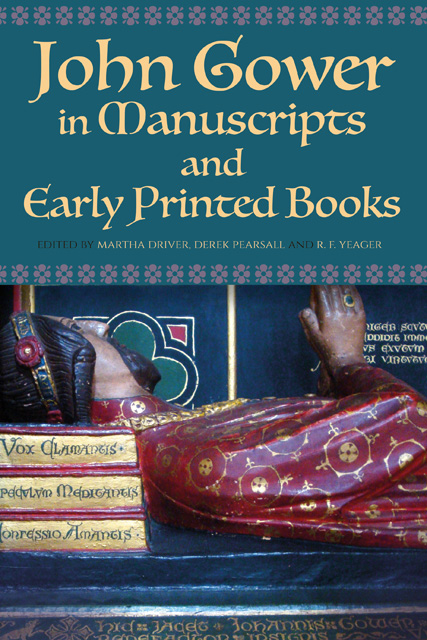9 - Gower between Manuscript and Print
Published online by Cambridge University Press: 18 January 2023
Summary
In tyme paste whanne this warke was prynted, I can not very well coniecte, what was the cause therof, the prologue before was cleane altered. And by that mene it wold seme, that Gower dydde compyle it at the requeste of the noble duke Henry of Lancastre. And all though the bokes that be wrytten, be contrary, yet I haue folowed therin the prynt copie, for as moche as it may serue both weyes, and bycause most copies of the same warke are in printe: but yet I thought it good to warne the reder, that the writen copies do not agre with the prynted. Therfore syr I haue prynted here those same lynes, that I fynde in the wrytten copies. The whiche alteration ye shall perceyue beganne at the .xxiii. lyne in the prologue, and goth forth on, as ye se here folowynge.
In the preface to his 1532 printing of the Confessio Amantis, Thomas Berthelette alerts his audience to the textual discrepancies he has found between the written books – the manuscript copies – and the printed ones, by which he means William Caxton’s edition of 1483. He is referring specifically to the differences in the Prologue that distinguish the Ricardian version from the Henrician text presented by Caxton, and he prints lines 24* to 92* in his Preface, to illustrate that difference. Accustomed as we are to Macaulay’s below-the-line, asterisked representation of the Ricardian commission story, Berthelette’s choice may seem at first to align with Macaulay’s editorial preference for the Henrician version. Examining Berthelette’s language, however, gives us rather a different story. Macaulay’s choice was based on an assessment of the manuscript record and on the critical assumptions of his day about how to represent an author’s final intentions, when dealing with a revised work. Berthelette’s decision, on the other hand, is based on attitudes towards the material witnesses and their status.
Berthelette presents his decision as a pragmatic one, saying that he has chosen to follow print for his own edition, rather than the manuscript record, as there are more printed books than there are manuscripts. By Berthelette’s day it doubtless was easier for Gower’s would-be readers to access print rather than manuscript copies.
- Type
- Chapter
- Information
- John Gower in Manuscripts and Early Printed Books , pp. 169 - 188Publisher: Boydell & BrewerPrint publication year: 2020

